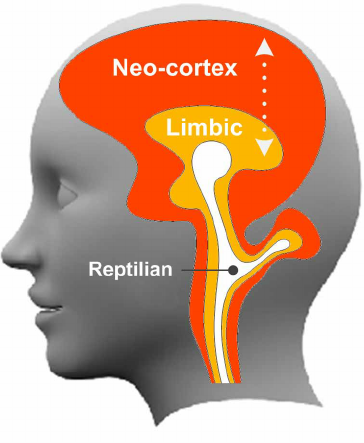Have you ever felt like an imposter at work? Like you don’t deserve the accolades you receive or that your abilities don’t measure up? That you’re a fraud just moments away from being found out?
You’re not alone.
Imposters attribute their success to external factors while minimizing their own contribution to their achievements.
Gaining insight about how it happens helps us create strategies on what to do about it.
How it happens
Three ways The Imposter develops include evolution, saboteurs, and not living our values.
Evolution
Humans are hard-wired to seek external threats and neutralize them. It’s why we see 10 negative articles in the daily newspaper for every positive one.
Science shows how evolution genetically rewarded those who paid attention to the threat of a sabre-toothed tiger by passing on those genes to future generations. Our alert ancestors survived by recognizing the danger; those picking daisies didn’t.

While we don’t face those external physical threats regularly anymore, tell that to our reptilian brains, the oldest structure of the brain that controls our basic functions (breathing, heart rate etc.) including our survival instincts. I have often wondered if feeling like an imposter today can be considered a type of evolutionary response meant to keep us on our toes, i.e. “alert” to threats.
Saboteurs
Saboteurs emerge during times of change and under stress. While we each live with certain saboteurs that formed from our childhood experiences (perfectionism is one of mine), all of us share one saboteur in common: The Judge. We judge ourselves, we judge others, and we judge situations.
Seeing ourselves as imposters is a self-judgement. It’s interesting because most of the time, we don’t see others as imposters. It’s ourselves we judge harshly.
Not living our values
Imposters feel phony, the opposite of what we feel when we’re living in alignment with our values. Discomfort arises when we don’t feel authentic. As we evolve personally and professionally, I consistently see clients wanting their authentic selves to emerge. Wearing a mask gets tiresome. Aligning your values with your actions lets your authentic self shine forth.
What to do about it
Addressing the imposter starts with identifying it. Unless we do so, we may engage in self-sabotaging behaviours without even recognizing them. Read the definition at the opening of this blog to familiarize yourself with what it looks like and how it feels.
Pinpoint when the imposter shows up for you. Is it when you:
- need to present to an audience?
- must convince a higher-up on the validity of your argument?
- are surrounded by peers and feel like a number?
Knowing when it shows up helps you anticipate how you might respond to it.
Understand the role of the Judge saboteur when you feel like an imposter. We’ve talked about ways to counteract saboteurs in the past. Click here for an example. One practice that I’ve found helpful in addressing my Judge saboteur is asking, “What advice would I give my best friend when she tells me she’s a fraud?”
Take your own advice.
Finally, know your values. Ultimately, we learn that our happiness comes from within not without. Feeling authentic, the opposite of phony, means living according to what matters to us not others. Once that transition occurs, external accolades aren’t so important. They become “nice-to-haves” versus a primary way of identifying ourselves.
Header Photo by Tamara Gak on Unsplash, Learning to Walk Photo by Jordan Christian on Unsplash

